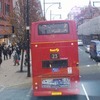 There are sadly those who view road accidents as an opportunity to mount dishonest or inflated compensation claims. However, as one case showed, developments in the law, combined with the motor insurance industry’s increasing vigilance, mean that they are likely to end up cheating no-one but themselves.
There are sadly those who view road accidents as an opportunity to mount dishonest or inflated compensation claims. However, as one case showed, developments in the law, combined with the motor insurance industry’s increasing vigilance, mean that they are likely to end up cheating no-one but themselves.
The case concerned a pedestrian who suffered a cardiac arrest after being hit by a bus. His life was saved after a passer-by performed CPR and he spent weeks in hospital, including three days in intensive care. Claiming that the accident had left him gravely disabled and in need of lifelong care, he launched a very substantial damages claim against the bus company and its insurers.
The insurers, however, successfully resisted his claim on the basis that it was fundamentally dishonest, within the meaning of Section 57 of the Criminal Justice and Courts Act 2015. The High Court found that covertly shot surveillance footage of him going about his life with no apparent difficulty was wholly at odds with his presentation to medical examiners as bed-bound and unresponsive.
The Court found that a doctor’s initial diagnosis, reached prior to the surveillance operation, that he was suffering from a severe conversion disorder was untenable. Having made a good recovery from his injuries, his disabilities were feigned and could not be explained on the basis that he had good days and bad. His claim was dismissed in its entirety, including those parts of it that were genuine.



